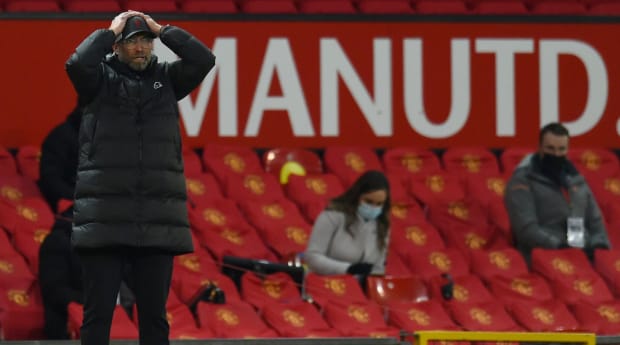After a 3–2 loss to Manchester United in the FA Cup, Liverpool has won only one of its last seven games.
Has the blip become a crisis? Perhaps not quite yet, but a 3–2 defeat at Manchester United in the FA Cup means Liverpool has won only one of its last seven games—and that was in the last round of the Cup against a depleted Aston Villa, forced by COVID-19 absences to effectively field a youth team. Jose Mourinho and Tottenham await in the league on Thursday.
There were perhaps some positive signs for Liverpool, but Jurgen Klopp has still not won at Old Trafford in six visits. There was a greater attacking cohesion, and a sense perhaps that Roberto Firmino is returning to form. But so rapidly have the storm clouds gathered that Liverpool could really do with more than just reasons for optimism. It was undone in the familiar United way, but a combination of counter-attacks and Bruno Fernandes.
Klopp has never previously shown much interest in the FA Cup. He has habitually used FA Cup weekends to rest players, and is yet to reach the quarter-final of the competition. But the side he picked at Old Trafford on Sunday, while not quite a first team—although given Liverpool’s injuries and fatigue, it’s not entirely clear what that might mean these days—was a notably stronger side than the one that had lost to Burnley on Thursday. Back came James Milner, Mohamed Salah and Roberto Firmino, while Joel Matip and Sadio Mane were rested for Rhys Williams and Curtis Jones.
After five league games without a win, it was a selection that suggested just how much Liverpool needed a victory. As Klopp found in his final season at Borussia Dortmund, downward spirals once entered can be very hard to break away from.

United’s priorities were harder to read. Solskjaer’s side may be top of the table, but whether this really is a title challenge is still not entirely clear. It has not yet beaten any of the Big Six or Leicester—the most likely top third of the table—in the league, and was outclassed by Manchester City in the Carabao Cup semi-final. Certainly its form is not sure enough to be cavalier about the Cup.
Solskjaer also made a number of changes, most notably leaving out Bruno Fernandes, and the result was a far more open game than the 0–0 draw in the league last Sunday. The pattern, though, was similar: Liverpool pushing high, United sitting deep and trying to strike on the break. It’s a detail that may explain the contrasting fortunes of the two sides this season comparative to last. Liverpool’s high pressing requires both a physical intensity and a level of preparation that is extremely difficult to achieve when the calendar is as compressed as it has been this season. United’s is a less systematized football, more based in individuals and moments, and so less reliant on detailed preparation.
It was Liverpool that took the lead after 18 minutes, Firmino, who has been out of sorts over the past month, bisecting Harry Maguire and Victor Lindelof, who were caught on the wrong side following a corner, to find Mohamed Salah, who scored with a deft chip. But United leveled with a classic breakaway eight minutes later, Paul Pogba winning the ball on the edge of his own box, and Marcus Rashford then finding Mason Greenwood with a delicious diagonal ball. The 19-year-old hadn’t scored in 10 games, but his left-foot finish was precise and firm.
United’s second followed a similar course, this time Greenwood setting up Rashford via an error from Rhys Williams. At that stage, Liverpool looked rattled, but it came again and leveled 10 minutes later, Salah tucking home after a neat interchange with Firmino and James Milner. But just as Liverpool seemed to be taking control, United won a free-kick on the edge of the box.
Fernandes, having come off the bench, smashed his free-kick round the wall, over a ducking Paul Pogba and just inside the post. For the eighth time this season, United came from behind to win. That may not, in the long term, be sustainable, but comebacks are part of the United heritage Solskjaer is so keen to invoke. His side in playing with confidence and has a number of individuals—Edinson Cavani, who headed against the post late on, Fernandes, Pogba, Rashford, Luke Shaw—all playing at the top of their game.
Liverpool, meanwhile, is spluttering. Self-belief is fragile and the philosophy that has underpinned its recent success seems incompatible with the compact COVID schedule. Its season is slipping out of control.